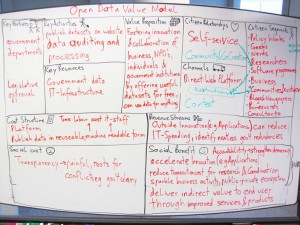
A visual model showing the value of open data
Prof. Robert Appleton of Ryerson University recently told me: “In most fields, the language [of communication] is still dominated by words and numbers.” I think he is right. Think about the daily routine in most organizations. We produce reports and strategy papers. We often forget to convey this knowledge into tangible pictures and stories.
Visualize Business Models
I bought the book Business Model Generation: A Handbook for Visionaries, Game Changers, and Challengers [72 slides free online at SlideShare] by Alexander Osterwalder. First, this book provides and easy understandable and visual approach for capturing the value and the implications of business models. This book is a useful “ready to use” tool to change the way in which you approach your work. Roger Martin, an advocate for design thinking in business says: “Businesspeople don’t just need to understand designers better – they need to become designers.”
Second, the book itself has a new business model. It is co-created by 470 practitioners.
Value Model of Open Data
The basic model of the book, “the business model canvass” can also be extended to government initiatives. The basic notion is that a government initiative must create value to be successful. Value is seen not only from a revenue/cost perspective, value also includes the tangible and intangible benefits for a society. Jeff and I had a whiteboard session at the nGenera office in Toronto to capture the value of Open Data. We both agreed that using the model is a valuable and exciting way to think about business models. Here is our result:

There is still some room for improvement on our canvas. For example, one needs to think about the aftermath of an application contest or innovation challenge. It is cool to have an awesome application/products, but who provides regular updates? The government might think of making a contract with the developer of the app or with other developers that submitted non-winning ideas. Another question is: How much money could the government save by using open data? (Laura Wesley, who works for the Canadian Government wrote an interesting blog article about that). Without getting lost in too much detail now, I think the Open Data Value Model clearly shows, that Open Data is a win-win project for every government. To read more about Open Data, check out some of the previous Wikinomics posts on the topic, including:
Collaborative platforms and open data as keys to the new public-private ecosystem
Open Government: It’s all about timing.
Phi Beta Iota: Apart from lowering costs and increasing diversity of inputs (innovation), the open data model also enables full accounting for the costs that are now externalized, manipulated, or hidden. Open data by itself is not enough. One must go “all in” across all the opens to achieve the optimal value.
See Also:



